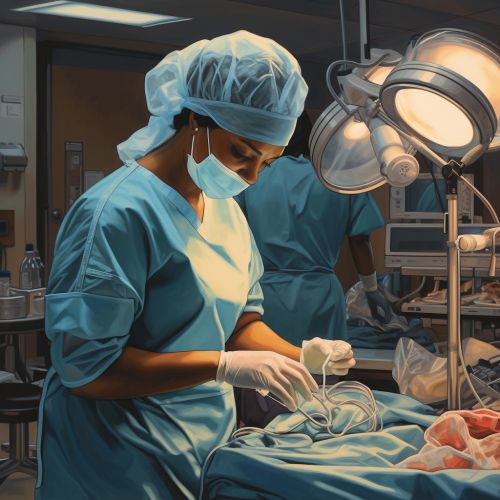Surgical technology
Overview
Surgical technology, also known as operating room technology, is a field of healthcare involving the use of technology in surgical environments. Surgical technologists, also referred to as surgical techs or operating room technicians, play a crucial role in surgical procedures, assisting surgeons, anesthesiologists, and nurses to ensure that operations run smoothly and safely. They are responsible for preparing the operating room, arranging equipment, and assisting doctors during surgeries.
History
The role of the surgical technologist has evolved significantly over time. In the early days of surgery, the surgeon was often assisted by a general nurse or even an untrained assistant. However, as surgical procedures became more complex and specialized, there was a growing need for trained professionals who could assist in the operating room. This led to the development of the surgical technologist profession in the mid-20th century.
Roles and Responsibilities
Surgical technologists have a wide range of responsibilities in the operating room. Before a surgery, they prepare the operating room by setting up surgical instruments and equipment, sterilizing tools, and ensuring that all necessary supplies are available. During the surgery, they assist the surgeon by passing instruments and supplies, holding retractors, and performing other tasks as needed. After the surgery, they help clean and restock the operating room.
Education and Training
Becoming a surgical technologist typically requires a postsecondary nondegree award or associate's degree. Most surgical technologists receive their training through a program at a community college or vocational school. These programs usually last between one and two years and include both classroom education and hands-on training in a clinical setting. After completing their education, surgical technologists can obtain certification through organizations such as the National Board of Surgical Technology and Surgical Assisting or the National Center for Competency Testing.
Certification
Certification for surgical technologists is not required in all states, but it is highly recommended. Certified Surgical Technologist (CST) and Tech in Surgery - Certified (TS-C) are two of the most common certifications. To become certified, surgical technologists must pass an exam that tests their knowledge and skills. They must also complete continuing education or reexamination every few years to maintain their certification.
Employment and Outlook
According to the Bureau of Labor Statistics, employment of surgical technologists is projected to grow 7 percent from 2019 to 2029, faster than the average for all occupations. Advances in medical technology have made surgeries safer and more common, leading to increased demand for surgical technologists. They work primarily in hospitals, but can also find employment in outpatient care centers and offices of physicians.
See Also
Surgical Nursing Medical Technology Healthcare Occupations


